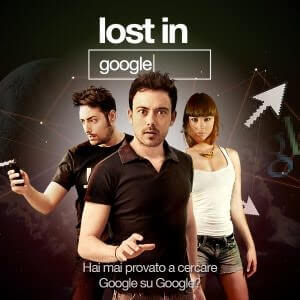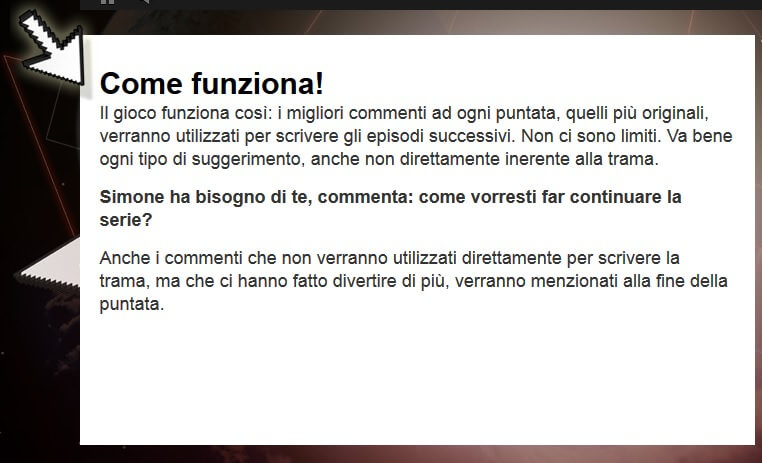We are in the aftermath of the 2013 Rome Film Festival, and like every year, news is going crazy on TV networks and newspapers, pulling out the stops about looks, scandals and news.
For our part, despite the immense pleasure, it would be off-topic to talk exclusively about cinema and television series, so we could focus our attention on the increasingly popular format of Webseries, that is, episodes of fiction made to be enjoyed through the Web.
“Bizarre,” you might think. But we have been spectators of this ever-increasing growth for a few years now; if 2010 had been the year when such products on the web were considered “test beds,” 2013 is experiencing their pure maturation and the catching up of other media.
Initially, webseries originated in youth collectives with the sole purpose of showing their own footage and bringing forth original content, lowering the huge production and postproduction costs, which, as we all know, can bend any film and television house.
Its origin dates back a few years. It was the year 2006 when a video/diary shot by a young girl with her webcam began to run on the fledgling Youtube. Her days became a cross-section of reality alternating with easy topics, such as teenage problems, religious vicissitudes. The views began to increase every day, becoming a real case, so much so that it stirred numerous journalists, who went on an advance search for the mysterious girl. The searches led to a shocking conclusion: this was not an amateur video, but a fiction, Lonelygirl15, created by film school graduates. So they came forward to share their ideas through major web channels, such as YouTube, engaging a niche audience, used to “playing” on the net. But with time things changed and there was a need to leave the amateur dimension and discover new forms of storytelling. In a few years, web series grew, developed, and began to attract professionals from other media, such as film.
At this point, the approach to cinema seems almost taken for granted. Both are containers of fictional realities, different but still similar; both represent two parallel and distant worlds at the same time, destined to “exist” together in the great sea of series.
Between the two the format of fruition certainly changes but certainly not the form and global reach, involving a “mass” of audiences of all ages.
The real difference? It lies in the fees . Mentre nel cinema girano cifre da capogiro, nelle webseries, considerate microcosmi, Youtube dà un euro ogni mille visualizzazioni. Praticamente nulla se teniamo conto delle spese sostenute durante le registrazioni. “Il problema” afferma Ivan Silvestrini, autore del pluripremiato Stuck, “è che le grosse produzioni consolidate stanno osservando con interesse il fenomeno, senza però aver ancora capito come sfruttarlo bene in termini economici. Dall’altra parte ci sono diversi autori che sollecitano una domanda nuova da parte del pubblico, comportando uno spostamento dalla tv tradizionale al web che ha bisogno innanzitutto di qualità”.
YouTube: is it worth it?
Every day, every hour and every minute millions of videos are viewed on YouTube, this is because it is able to disseminate content quickly. The opportunity of this channel, however, is not only sharing, which is already fundamental in itself, but also the possibility of undertaking marketing activities.
YouTube offers users a multitude of chances for the promotion of their ideas, from simple videos to advertising campaigns, in a few simple steps: register, upload and spread; only when “serious” numbers of views are reached can one move on to the next step, which is to invest budget on the channel. For this reason it is identified as an important Social Network superior to Facebook and Twitter with the goal of increasing visibility and generate traffic aimed at maximum return on one’s investment.
In fact, 100 million people interact on YouTube, watching videos and sharing them on social or communities. Undoubtedly, therefore, whether you want to publicize a company, a video or a webseries you have to take into account the weapons in the hands of YouTube, which is localized in 39 countries and available in about 54 languages.
What are the basic rules to keep in mind to convince yourself that it is worth advertising a video on YouTube:
- a video is the best investment in reaching a potentially global audience because of its winning numbers;
- videos get to the point, conveying a lot of information in a short time;
- compared to the costs of traditional advertising, making a video is cost-effective;
- anyone who likes videos, especially those interested in buying online, are enticed to buy with a video explaining the product;
- allows the interested target audience to be reached without wasting the investment;
- there can be an important synergy with other web tools: therefore, it is recommended to share the link on social networks and embed it on one’s business site or blog;
- YouTube can highlight keywords through 120 characters. With the tags chosen, in fact, it is possible to be more creative and, at the same time, have a better chance of being found by Google’s algorithm.
After the brief excursus on Youtube and its influence on today’s landscape, one cannot underestimate the taste of a young audience and the need to create compromises with external demands, which in this case respond to the web.
We have a mass culture influenced by American-style TV series; it is not the difference between the television medium and the web that is important, but between what people would like to see and what is proposed to them.
In a moment cinema, television and the web become complementary, breaking all kinds of barriers. However, they are still cases in the making in a scenario in which the big productions still watch the big wave of the web from behind, probably without understanding and afraid to invest. “The usual blunder? It will last a season,” they will think. So it did not, finding ourselves years later attending the presentation of web series during the Rome Film Festival.
Web Series in Italy
The 8th edition of the Festival already had the basis to become a real novelty, but it was even more so by opening up to the web and presenting the 7 award-winning series at the last edition of the Rome web fest, the first international festival. Here is the quantum leap for webseries, landing in the big event with two entirely dedicated days, November 13 and 14. The first day, named “The Best of…,” featured:
- Ludovico Bessegato’s Bad Things,
- Lost in Google by Simone Russo,
- Revolution by Gianluca Della Monica,
- Run Away The Series by Riccardo Cannella,
- Soma by Francesco Vitiello,
- Stuck by Ivan Silvestrini,
- Maybe it’s me by Vincenzo Alfieri.
The second day, on the other hand, was devoted to the debate “The Financial Dynamics of Web Series,” seeing speeches by, for example, Luca Vecchi(the Pills), Bruno Zambardino (Professor of Wisdom), Gabriele Niola (Film Critic) and many other experts.
Here it is that, even in Italy, the great critical minds of cinema have “stooped” to comment and judge what has been raging on every side of the cosmos for the past few years.
Let us not ask questions.
Lost In Google
To conclude I would like to point out among the presentations at the Film Festival, the revelation of the moment Lost in Google, the science fiction Webseries created by Francesco Capaldo, Simone Russo and Alfredo Felaco.

The narrative cue goes back to the question: what happens by searching Google on… Google?
Thus begins the adventure of the protagonist Simone, sucked into the web and then back home. The search breaks down the barrier separating real world and virtual reality, establishing an original and sympathetic communication, episode after episode. The striking innovative element is the science fiction setting, almost surreal, and the interaction with users that is somewhat reminiscent of our previous article on Breaking Bad. The protagonists try to communicate with their users through photos, Faceboook and comments that gradually create the series itself, not remaining mere judgments. In fact, the production decided to take advantage of the best comments, written directly below the episode on YouTube or on the official website, to script subsequent episodes and find the protagonist among the web meshes.
What happened to Simone? The users decide.
It is a web series in itinere where vox populi has the upper hand and reinvents the very concept of series and webseries.
Everything, then, seems to subvert the old rules of classic storytelling, first the move to the web, then the leaving the reins directly to the users. Skeptics, well anchored in the past and narrative logic, will wonder.
“but what world are we in?”
At this point … Let’s ask the users.

